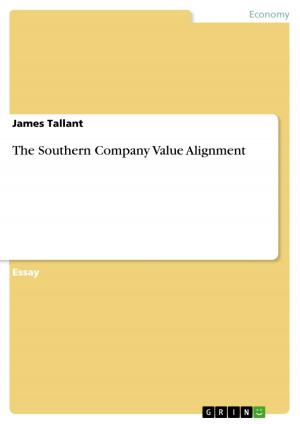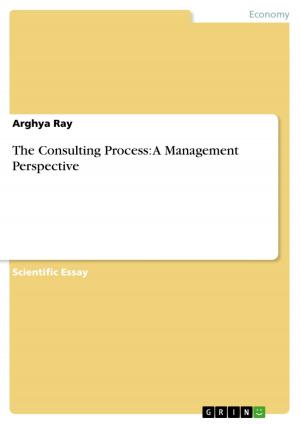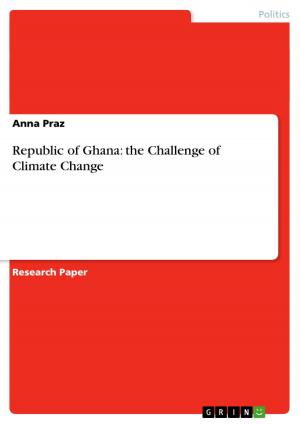AfD and PEGIDA.Origins, threats and solutions
Nonfiction, Social & Cultural Studies, Political Science, International, Foreign Legal Systems| Author: | Anonymous | ISBN: | 9783668256293 |
| Publisher: | GRIN Publishing | Publication: | July 11, 2016 |
| Imprint: | GRIN Publishing | Language: | English |
| Author: | Anonymous |
| ISBN: | 9783668256293 |
| Publisher: | GRIN Publishing |
| Publication: | July 11, 2016 |
| Imprint: | GRIN Publishing |
| Language: | English |
Seminar paper from the year 2016 in the subject Politics - Political Systems - Germany, grade: 1,0, Emory University (Candler School of Theology), course: History of Christian-Muslim Relations, language: English, abstract: 'Islam does not belong to Germany.' This statement, which is taken out of the Alternative for Germany's (AfD) party platform, conflicts with 4.89% of the German population being Muslims as of 2012. What makes the AfD as well as the protest movement 'Patriotic Europeans Against the Islamisation of the West' (PEGIDA) believe that the religion of about 5% of the population does not belong to Germany? How do they even get to a statement like that in a country that has religious freedom as part of its Grundgesetz? On March 13, 2016 three states elected their state parliaments. The AfD reached between 12.6% and 24.3% of the votes. What makes the anti-Islam and anti-refugee rhetoric so appealing? Where is the frustration coming from? While the AfD celebrates their election victories and PEGIDA still has four-digit turnouts, the violence against Muslim individuals and communities increases. In the first half of 2015 alone, 23 Mosques were attacked. The crime rate against Muslim individuals remains unclear since the statistics of the police record anti-Muslim as a distinct category. The urgency of the subject is clear. In order to think about ways of dealing with the AfD as well as PEGIDA, the following paper will deal with the origins of the protest movement and the party as well as their positions and opinions regarding Islam and Christian-Muslim relations. I will end discussing the threats that come from these movements and look into possible solutions. My main thesis for the paper is that the threat to German culture is not Islam but anti-diversity movements like PEGIDA and AfD. I base this on the lessons Germany (should have) learned from its Third Reich history and on European values. The first part of the paper has an historical approach, the second part focuses on political demands and the third part will be an attempt to find ways to better the situation.
Seminar paper from the year 2016 in the subject Politics - Political Systems - Germany, grade: 1,0, Emory University (Candler School of Theology), course: History of Christian-Muslim Relations, language: English, abstract: 'Islam does not belong to Germany.' This statement, which is taken out of the Alternative for Germany's (AfD) party platform, conflicts with 4.89% of the German population being Muslims as of 2012. What makes the AfD as well as the protest movement 'Patriotic Europeans Against the Islamisation of the West' (PEGIDA) believe that the religion of about 5% of the population does not belong to Germany? How do they even get to a statement like that in a country that has religious freedom as part of its Grundgesetz? On March 13, 2016 three states elected their state parliaments. The AfD reached between 12.6% and 24.3% of the votes. What makes the anti-Islam and anti-refugee rhetoric so appealing? Where is the frustration coming from? While the AfD celebrates their election victories and PEGIDA still has four-digit turnouts, the violence against Muslim individuals and communities increases. In the first half of 2015 alone, 23 Mosques were attacked. The crime rate against Muslim individuals remains unclear since the statistics of the police record anti-Muslim as a distinct category. The urgency of the subject is clear. In order to think about ways of dealing with the AfD as well as PEGIDA, the following paper will deal with the origins of the protest movement and the party as well as their positions and opinions regarding Islam and Christian-Muslim relations. I will end discussing the threats that come from these movements and look into possible solutions. My main thesis for the paper is that the threat to German culture is not Islam but anti-diversity movements like PEGIDA and AfD. I base this on the lessons Germany (should have) learned from its Third Reich history and on European values. The first part of the paper has an historical approach, the second part focuses on political demands and the third part will be an attempt to find ways to better the situation.















